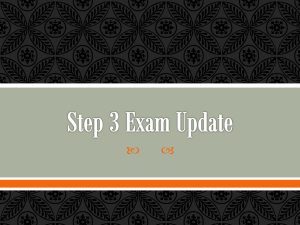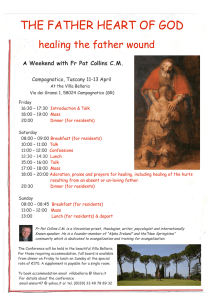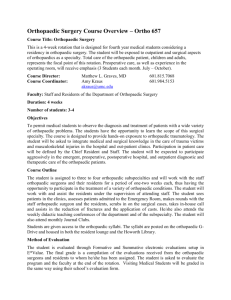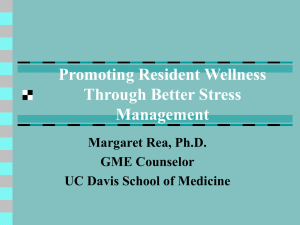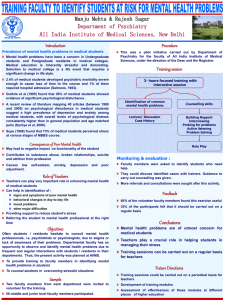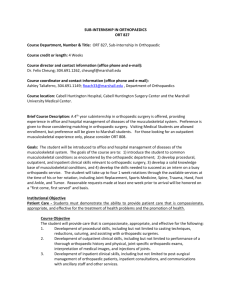Orthopaedic Rotation - University of Maryland Medical Center
advertisement
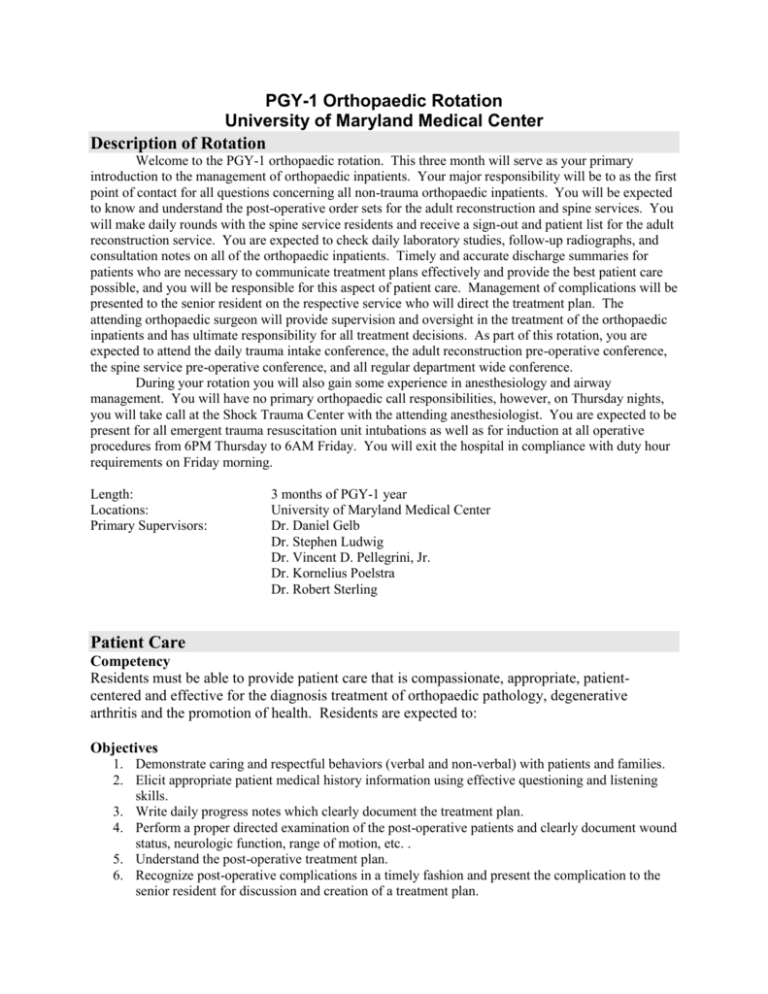
PGY-1 Orthopaedic Rotation University of Maryland Medical Center Description of Rotation Welcome to the PGY-1 orthopaedic rotation. This three month will serve as your primary introduction to the management of orthopaedic inpatients. Your major responsibility will be to as the first point of contact for all questions concerning all non-trauma orthopaedic inpatients. You will be expected to know and understand the post-operative order sets for the adult reconstruction and spine services. You will make daily rounds with the spine service residents and receive a sign-out and patient list for the adult reconstruction service. You are expected to check daily laboratory studies, follow-up radiographs, and consultation notes on all of the orthopaedic inpatients. Timely and accurate discharge summaries for patients who are necessary to communicate treatment plans effectively and provide the best patient care possible, and you will be responsible for this aspect of patient care. Management of complications will be presented to the senior resident on the respective service who will direct the treatment plan. The attending orthopaedic surgeon will provide supervision and oversight in the treatment of the orthopaedic inpatients and has ultimate responsibility for all treatment decisions. As part of this rotation, you are expected to attend the daily trauma intake conference, the adult reconstruction pre-operative conference, the spine service pre-operative conference, and all regular department wide conference. During your rotation you will also gain some experience in anesthesiology and airway management. You will have no primary orthopaedic call responsibilities, however, on Thursday nights, you will take call at the Shock Trauma Center with the attending anesthesiologist. You are expected to be present for all emergent trauma resuscitation unit intubations as well as for induction at all operative procedures from 6PM Thursday to 6AM Friday. You will exit the hospital in compliance with duty hour requirements on Friday morning. Length: Locations: Primary Supervisors: 3 months of PGY-1 year University of Maryland Medical Center Dr. Daniel Gelb Dr. Stephen Ludwig Dr. Vincent D. Pellegrini, Jr. Dr. Kornelius Poelstra Dr. Robert Sterling Patient Care Competency Residents must be able to provide patient care that is compassionate, appropriate, patientcentered and effective for the diagnosis treatment of orthopaedic pathology, degenerative arthritis and the promotion of health. Residents are expected to: Objectives 1. Demonstrate caring and respectful behaviors (verbal and non-verbal) with patients and families. 2. Elicit appropriate patient medical history information using effective questioning and listening skills. 3. Write daily progress notes which clearly document the treatment plan. 4. Perform a proper directed examination of the post-operative patients and clearly document wound status, neurologic function, range of motion, etc. . 5. Understand the post-operative treatment plan. 6. Recognize post-operative complications in a timely fashion and present the complication to the senior resident for discussion and creation of a treatment plan. 7. Contact consultant services and provide a concise and accurate patient problem and reason for the consultation 8. Effectively counsel patients and families and caregivers about the plan of care. 9. Participate on the inpatient team under the supervision of attending faculty. 10. Perform accurate and timely discharge summaries. Medical Knowledge Competency Residents must demonstrate knowledge of established and evolving biomedical, clinical, epidemiological, basic science and social-behavioral sciences, as well as the application of this knowledge to patient care. Residents are expected to be able to: Objectives 1. Demonstrate a thorough knowledge of basic anatomy. 2. Identify radiologic findings on imaging studies and thoroughly describe the findings at trauma conference. 3. Understand the pathophysiology of common post-operative complications including: ileus, deep vein thrombosis, pulmonary embolism, myocardial infarction, stroke, wound hematoma, wound infection, neurologic compromise, compartment syndrome, urinary retention, etc. 4. Cite levels of evidence in the orthopaedic case –driven medical literature. 5. Differentiate between patients who have emergent and non-emergent conditions. Practice- Based Learning and Improvement Competency Residents must demonstrate the ability to investigate and evaluate their care of patients, to appraise and assimilate scientific evidence, and to continuously improve patient care based on constant self-evaluation and life long learning. Residents are expected to develop skills and habits to be able to: Objectives 1. 2. 3. 4. 5. 6. 7. 8. 9. Evaluate one’s own knowledge, incorporating feedback from others, especially faculty. Modify self-directed learning appropriately, including feedback provided from the OITE results. Appraise and assimilate evidence from scientific studies to enhance patient care Effectively use information technology to access and manage patient information. Effectively use information technology and other resources to support one’s own ongoing selfeducation (Pub Med, WWW, DVDs, CDs, Vumedi, etc). Contribute to discussions concerning patient care with other health care professionals, attendings, including consultants. Demonstrate facility in the critical reading of a manuscript through active participation in Journal Club Attend and participate in teaching conferences and rounds. Facilitate the learning of medical students and other health care professionals. Systems Based Practice Competency Residents must demonstrate an awareness of and responsiveness to the larger context and system of health care, as well as be able to effectively call on other resources in the system to provide optimal health care. Residents are expected to: Objectives 1. Collaborate with and maintain appropriate professional attitudes and behaviors toward other medical professionals and allied health personnel. 2. Know how types of medical practice and delivery systems differ from one another, including methods of controlling health care costs and allocating resources. 3. Practice cost-effective health care and resource allocation that does not compromise quality of care. 4. Assess how one’s own actions affect others, especially in the hand service setting. 5. Use diagnostic and therapeutic procedures appropriately and judiciously. 6. Carefully and thoughtfully evaluate the risks, benefits, limitations, and costs of patient care. 7. Provide data for M&M conferences to positively affect patient care. 8. Participate in clinical pathways designed to improve patient outcomes. 9. Serve as patient advocates in dealing with system complexities. 10. Serve as patient advocates for quality patient care. 11. Work effectively with other services, health care agencies, and case managers. 12. Work to improve the system of medical care at University of Maryland Medical Center. 13. Provide information on systems issues that may improve patient care (this performed at department meetings). 14. Know how to partner with health care managers and health care providers to assess, coordinate, and improve health care and know how these activities can affect system performance. Professionalism Competency Residents must demonstrate commitment to carrying out professional responsibilities and an adherence to ethical principles. Residents are expected to: Objectives 1. Demonstrate a commitment to carrying out professional responsibilities, adherence to ethical principles, and sensitivity to a diverse patient population. 2. Maintain professional behavior at all times including appropriate dress, language, and conduct in all clinical settings. 3. Demonstrate respect, compassion, and integrity while carrying out professional responsibilities with an adherence to ethical principles and standards, and with a sensitivity to the diverse patient population with whom he/she is exposed 4. Exemplify reliability, punctuality, integrity, and honesty. 5. Accept responsibility for one’s own actions and decisions. 6. Demonstrate a responsiveness to the needs of patients and society that supersedes self-interest 7. Apply sound ethical principles in medical practice, including issues of patient confidentiality, informed consent, provision for the withholding of care, and interactions with insurance companies and disability agencies. 8. Consider the effects of personal, social, and cultural factors in the disease process and patient management. 9. Demonstrate non-judgmental sensitivity and responsiveness to the age, culture, disability status, and gender of patients and colleagues. 10. Understand and be empathetic to the patient with amputation loss. 11. Understand and demonstrate the ability to obtain an informed consent from a patient that includes the presentation of the natural history of both surgical and non-surgical treatment of the patient’s condition as well as an appropriate discussion of the risks and benefits of surgery. 12. Demonstrate sensitivity to the age, gender, culture, and disabilities of fellow health care professionals 13. Demonstrate appropriate conduct in the timely completion of admission history and physicals, operative reports, and discharge summaries 14. Demonstrate a commitment to ethical principles pertaining to: a. provision or withholding of clinical care b. confidentiality of patient information c. informed consent d. business practices Interpersonal and Communication Skills Competency Residents must demonstrate interpersonal and communication skills that result in the effective exchange of information and teaming with patients, their families, and professional associates. Residents are expected to: Objectives 1. Establish trust and maintain rapport with patients and families. 2. Complete dictations and chart notes in a timely manner (monitored by medical records department and Program Director.) 3. Discuss diagnoses, prognoses, and treatment options clearly and accurately to patients. 4. Synthesize information and present clinical and diagnostic information clearly to colleagues. 5. Effectively use listening skills in communication with all parties involved in patient care 6. Communicate and interact with staff/team in respectful, responsive manner. 7. Work effectively with other members of the team, specifically medical assistants, other residents, fellows, nurses, and therapists Teaching Methods The PGY-1 resident is accountable the attending service faculty (primarily Gelb, Ludwig, Pellegrini, Poelstra, and Sterling). Teaching is by case-method with didactic support in the form of trauma intake conference and pre-operative conferences, basic science lectures, journal club, grand rounds, morbidity and mortality conferences. Improvement in knowledge, patient care and communication skills is expected and monitored. Assessment Method (residents) Resident performance will be subject to daily formative evaluation. Monthly rotation evaluations will be performed by each of the faculty supervisor using the E-value system. Semiannual Program Director evaluation meetings will provide summative evaluation.


